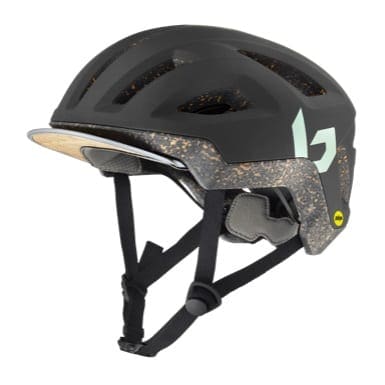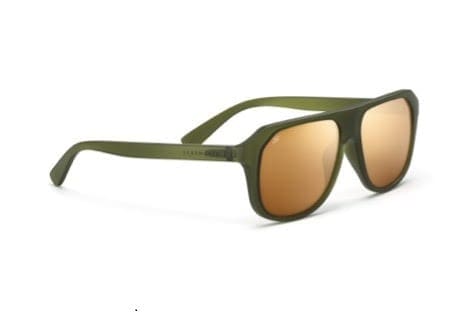Bollé Brands Commits to Development of Sustainable, Eco Friendly Products

Serengeti Launches New Eco-Nylon Sunglass Frames, Bollé Introduces Bamboo Based Bike Helmet
Bollé Brands, which has been leaning on innovation such as Augmented Reality and Artificial Intelligence to separate itself from competitors is now using its innovation advantage to deliver eco-friendly sunglasses and helmets for this Spring.
The first two products to come out of this Eco effort are the Bollé Eco React cycling helmet as well as durable and stylish new plant-based nylon frames that are used in much of Serengeti’s Sport summer 2021 collection.
These new eco-driven product launches come on the heels of recent Bollé technology innovations that were centered around Augmented Reality and Artificial Intelligence. The company is also set to disrupt the market once again with a new innovation launch that combines both AI and AR that is set to debut later this spring.
The Volt+ is a high contrast lens that used AI to evaluate 20 million different color combinations before determining the perfect lens. The brand is also using Augmented Reality to allow customers to not only see what its helmets and sunglasses look like on your face, but to then look out through Bollé’s top of the line Phantom lens to experience the highest performing lens on the market. This technology allows consumers to try on and try out Bollé at home and then place an order with a participating retailer.
The new Volt + lens is the result of work done in the company’s EPIC Design Center in Lyon, France. The success of the EPIC Design Center and the many innovations it has produced has led the company to open a second EPIC Design Center in San Diego, CA. which expects to start operating in the coming months.
“It was a tough year for everyone, but we were able to use the time to forge ahead in our EPIC Center with new performance driven innovations,” said Tove Fritzell, Director of Product & Innovation at Bollé.
Bollé Eco React Mips Helmet
With the new Eco React Mips, Bollé is challenging the traditional way to make helmets, replacing some plastic and petroleum with organic materials to reduce the environmental impact
“The same qualities that make our helmet lightweight, comfortable, and safe also make it eco-friendly,” said Fritzell.
The new Eco React combines natural materials like cork, cotton and bamboo with EPS shock absorbers and MIPS brain protection system to deliver the highest performance cycling helmet along with a great sustainability story.
“It’s our natural response to the needs of cyclists who want to pursue an active lifestyle in the city while doing their part for the planet,” said Fritzell.
The Eco React includes:
- 40 Percent recycled materials in the PC Shell
- 20 Percent cork EPS
- Renewable bamboo fiber used for the comfort lining
- 50 percent renewable cotton fiber in the strap
Serengeti Eco Nylon Frames
For Serengeti, which prides itself on superior craftsmanship, the company is introducing a new Eco-Nylon frame material that serves as the centerpiece of the new Serengeti Sport Collection.
“Climate change is the most important issue facing humanity and it’s more important than ever before to ensure we take steps to minimize our ecological impact,” said Arnaud Falce, Serengeti Creative Director.
The new frames are made from a polymer called Grilamid BTR which is a sustainable substitute for TR90 which is the more common nylon material used in most frames. The new Grilamid BTR is extracted from Castor Plants and offers the same characteristics that frames made with TR90 Nylon offer which include durability, flexibility and strength without the use of petrol.
The castor oil plant is mainly cultivated in India. During their growth phase, these plants are capable of binding large amounts of Co2. The castor oil seeds contain a large share of oil, which can be modified to create primary raw materials for various bio-polyimides. With the partially bio-based material, Grilamid BTR, an amorphous transparent bio-polyamide, the reduction in Co2 emissions compared to traditional transparent polymers, such as PMMA or PC is more than 40 percent. The end result is a bio-sourced, petrol free frame with a lower ecological impact
Serengeti Packaging
The effort to create sustainable products extends beyond frames as Serengeti has also committed to improving its packaging. Only plant-based fibers are used to create packaging that is less intrusive on the environment. Vegan leather cases are 100 percent FSC Certified.
“We worked on an optimized packaging process to avoid the use of plastic bags which saves us from using 33,000 plastic components,” said Falce. He notes that any plastic elements that remain are now fully recyclable Bio-Plastics.
All new carton packaging are made of 40 percent recycled kraft cardboard, which is 100 percent recyclable. Even the lens cloth and pouches sold with the glasses are made of 100 percent recycled PET.







